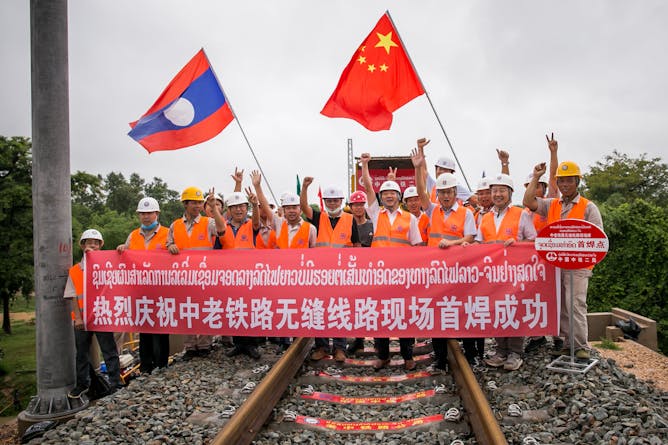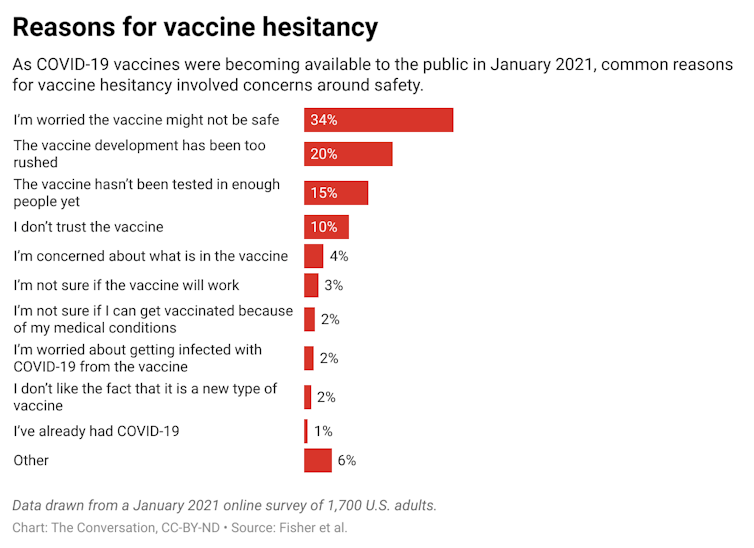|
Professors and students are back on campuses to resume studies and start new research, in a year getting closer to normal.
At The Conversation U.S., we’re excited for another busy year of turning the expertise of scholars into journalism for the public. It’s an important responsibility and a great privilege to work with experts on this mission at a time when misinformation is so common and so dangerous. We’ve provided vital information on the latest research into COVID-19, and all aspects of the pandemic. Look at what we have today: articles on climate change, on China’s environmental impact and on the ethics of eating bugs.
If you think the work we do is valuable, we hope you will support our newsroom over the next week.
Donate
Today
Your donation not only keeps our articles free for all to read but also supports our efforts in increasing the diversity of experts in media and in new multimedia storytelling partnerships.
Thank you in advance for your generosity.
|

Chinese engineers pose after welding the first seamless rails for the China-Laos railway in Vientiane, Laos, June 18, 2020.
Kaikeo Saiyasane/Xinhua via Getty Images
Blake Alexander Simmons, Boston University; Kevin P. Gallagher, Boston University; Rebecca Ray, Boston University
Through its Belt and Road Initiative, China has become the world’s largest country-to-country lender. A new study shows that more than half of its loans threaten sensitive lands or Indigenous people.
|
Environment + Energy
|
-
Amrou Awaysheh, Indiana University
A growing number of countries and companies have pledged to reach net-zero emissions by 2050 or earlier. But there’s a catch – they still plan to keep emitting greenhouse gases.
-
Tianshu Li, University of Virginia
Bats roost under bridges and culverts across North America, so highway departments have to check for them before repairing bridges. A new AI tool makes those inspections faster and more accurate.
|
|
Arts + Culture
|
-
Jamal J. Elias, University of Pennsylvania
War rugs are more reflections of market forces than memorials to suffering.
|
|
Politics + Society
|
-
Kimberly Speers, University of Victoria
Justin Trudeau has been elected Canadian prime minister for the third time. But he failed to win the majority he wanted.
-
Regina Smyth, Indiana University
Russia’s Central Election Commission announced results that give a strong majority to United Russia. It was met with skepticism, if little surprise.
|
|
Economy + Business
|
-
Anna Nagurney, University of Massachusetts Amherst
Before the container was standardized, loading and unloading goods was very labor-intensive, inefficient and costly.
|
|
Health
|
-
Abigail Kumral, University of Virginia
With mask-wearing and kids out of school last winter, viral upper respiratory infections decreased. However, clinicians have seen a return of respiratory viruses this summer and ear infections are up too.
-
Lucas Berenbrok, University of Pittsburgh; Elaine Mormer, University of Pittsburgh
Only 3.7% of people in the U.S. with hearing difficulty own hearing aids. Thanks to a federal law in progress of being implemented, OTC hearing aids may help bridge the gap.
|
|
Ethics + Religion
|
-
Matan Shelomi, National Taiwan University
Insect farming is growing in popularity as an alternative to traditional livestock and feed production. A scholar evaluates what that means in terms of trillions of insect lives.
|
|
From our International Editions
|
-
Joseph Siegle, Africa Center for Strategic Studies; Daniel Eizenga, Africa Center for Strategic Studies
Any recognition of the coup could incentivise future ones. Yet Alpha Condé can’t simply be restored to office, sweeping under the carpet the dubious basis on which he has retained power.
-
AJ Mitchell, Australian National University
Nuclear submarines are powered by a miniature onboard fission reactor. They can go for decades without refuelling, making them faster, stealthier and much more expensive than conventional submarines.
-
Anwen Elias, Aberystwyth University; Matt Wall, Swansea University
A government consultation is seeking views on reforming the union, rather than leaving it.
Today’s graphic

From the story, A direct recommendation from a doctor may be the final push someone needs to get vaccinated
|
|